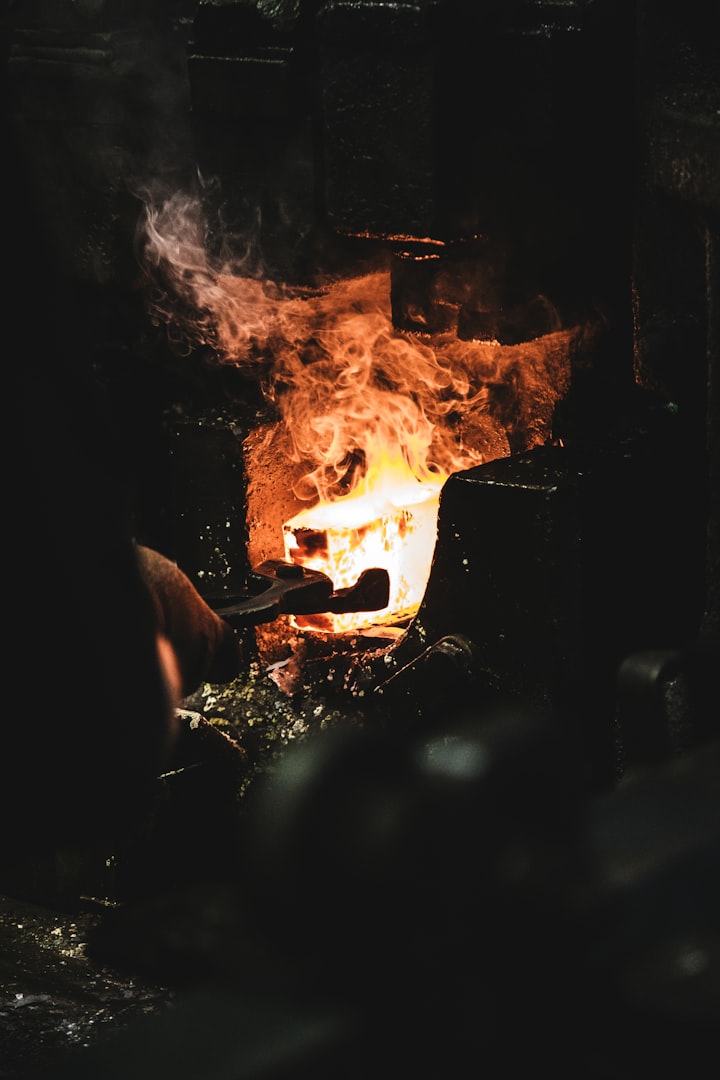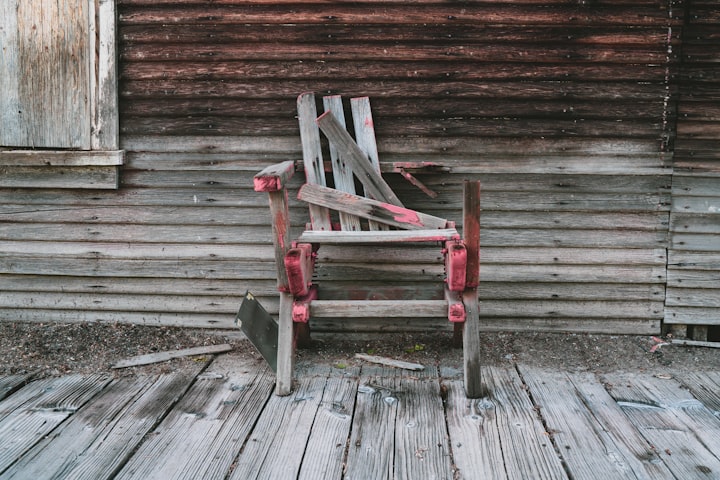Keats by Candlelight
So we may capture the things of beauty all around us.
There would be a green glow, they said, when the meteor entered the atmosphere.
"The meteor is largely comprised of iron and nickel. As it enters the Earth's atmosphere, the nickel in the external layer will vaporize, producing a greenish glow. Once you see green flashing through the sky, the people of India and neighboring nations will have about ten hours to set their affairs in order. Indonesia, the Philippines, Australia, and all neighboring islands will also be hit, along with much of the Middle East and Eastern Africa." That's what the man on the TV had said.
Arun's family had tried to flee when they first heard about it, but China, Kazakhstan and Mongolia had already become too crowded. The world was overpopulated enough, and now with 50% of all habitable land in the flood zone, the remaining safe zones were putrid with overpopulation. Throngs of refugees succumbed to starvation and disease. Hospitals overflowed to their breaking point and corpses lined the underpasses of roads. The governments promptly barred any more people from entering. Now, you could only gain admittance through lottery---a new lottery ticket drawn for every 10 people that died.
They stopped trying long ago. It soon became clear that it was not a true lottery. The officials were bribed with money, servitude, sex and Arun's family had nothing of the sort to offer. They were farmers. Their family had grown wheat to feed the people of India for eight generations. They had only a few acres of land in the flood zone, and nothing precious to their names.
Instead, they watched as their last door of hope closed before them, leaving them with a few months to complete their last rites, and watch for green in the sky. Arun's village was quiet these days. Most people traveled to other cities, to be with their loved ones. The remaining few milled listlessly among the village, waiting to die. Arun never liked to wait. He got dressed one day and told his parents he was going to see the blacksmith in town.
"But he's a drunk," his mother protested, "You shouldn't associate with him."
"So what?" his father interjected, "He's a dead man, like the rest of us. Let the boy do as he wishes."
Arun walked to the blacksmith's disheveled home. The door was hanging open, and he could see the blacksmith leaning against a wall in the dark room.
"I've come to ask you about the properties of steel," Arun said. "How to mold it and create things with it. Can you teach me?"
The blacksmith laughed at him. His breath was ripe with liquor and tobacco, and his hearty laugh soon turned to wretched coughing. Arun watched with disgust as the blacksmith's bony shoulders shuddered with each rasping cough. He spit some black tobacco on the dirty floor of his home and took another gulping swig of liquor.
"Steel, eh boy? Why? Want to make jewelry for a sweetheart? Hoping to know a woman before dying eh?"
Arun shook his head but the blacksmith raised his hand.
"No need to lie to me. I can respect the last wishes of a dying man-in-the-making."
He heaved himself up, "Come on boy, I'll teach you of steel and to help make you a man. Consider it my last good deed!" The blacksmith threw his head back in laughter and slapped Arun's shoulder. Arun followed him to his shop. He would visit the shop every day after that.
His parents thought it strange. But they always thought him a strange boy, with his head always in books that never helped anyone. As a child, his mother begged him to learn English and study engineering.
"It's your only way out of this village!" she insisted.
Arun did learn English, but only to read its poetry. He pored over Shakespeare's sonnets and Wordsworth's ballads. He marveled with Blake and Byron at the power and vulnerability of nature and man's enduring place in it. Whitman, Coleridge and Shelley were his companions through his adolescence, but it was in Keats that he truly found his kin. Arun read Keats late into the night, only to arrive exhausted to work in his father's wheat field the next morning. He wasted candle after precious candle to search the mind of a man who quietly observed the wind in summer, the joy of grief, and the force of the written word. He once tried to explain this to his mother.
"Keats recognized his purpose in the universe, Amma! Don't you see? He teaches us that our very existence is a fixed moment in the spectrum of space and time, and all we can do is capture that moment we exist in."
In response, his mother had prayed to the gods for patience. "Keats is dead, Arun! Talking about Nightingales and Greek pots won't get you out of this village."
"It's not a pot, Amma, it's an urn!"
"Shut up! What is an urn, if not a fancy pot? Listen Arun, people like us can't afford to squander time on poetry. If you want to waste candles on reading, please at least read something useful. I bought you an engineering review book. Read that instead."
Arun stormed out of the house. She'd never understand that engineering could bring him no more peace than farming would.
He often wondered what would happen to his family's bodies after they died. He thought about how their bodies would be sifted into the sea, taking their land, and possessions with them. In the water, their bones would drift far from each other and disintegrate out of memory to anybody living after them.
Even if one day, archeologists exhumed their remains, it would carry no information. The water would have worn down all indication of their legacy. They wouldn't know his father carried the heritage of eight generations of Indian farmers who put food in the belly of a growing nation. They wouldn't recognize that his mother prayed to the gods every day that her son would know a better life. And they'd never know that he read Keats by candlelight, wasting his dreams on Grecian Urns and things of beauty.
No, the people of tomorrow would study about India the same way he studied about Mesopotamia and Persia. His family, his people would be diminished into faceless, soulless collections of history book chapters. The water would make sure of that. But gold, silver, and steel, he had read, was largely impervious to the corrosion of saltwater.
His family never had much gold or silver to begin with, but steel was scattered throughout their vacant farm--forged into plows, rakes, blades, and bolts. Arun collected them and dragged them to the blacksmith to melt.
"Did you know that steel was first discovered here, in Tamil Nadu?" the blacksmith had asked him.
Arun shook his head. The blacksmith sniffed. "No, they don't teach our people things like that. They like to pretend the white man discovered it."
Arun said nothing. The blacksmith was drunk, as usual.
"Steel was invented by our people!" the blacksmith roared, pounding his chest. "Over 3,000 years ago we wrestled with the iron the gods gave us and created a perfect alloy. We called it Wootz, and sold it by ships to the rest of the world. They had never seen anything like it before. Is there any mention of Wootz steel in those books you read?"
"None."
The blacksmith rubbed the back of his head sadly. "Too bad," he said, "that the future will forget we gave them such a gift."
Then they were quiet, and continued their month long work of etching careful designs into the heated metal. They were almost finished. All that was left was to temper it.
At 5 in the morning, the next day, just as the first hints of dawn speckled the sky, a burst of neon green light blazed in the horizon. Its glow overtook the dawning sun but faded as quickly as it came until it was enveloped once again in the distant darkness. It had come a week earlier than they expected.
Arun woke to wailing in their village. His saw his mother weeping into his father's arms. He sprang out of bed and ran with all his might to the shop. The blacksmith was already awake, cursing at him.
"Hurry, boy! We need to temper it! Pump the fire!" Arun grabbed the handle of the kiln and pumped. The blacksmith prowled in and out of the shop restlessly, like a wild thing in the jungle and shouted at Arun to put his back into it. When he decided that the heat was enough, he picked up a large metal vase with carvings engraved on the side and thrust it into the fire. Just as it glowed orange, he removed it, and ran outside to expose it to the coolness of morning air. After a short period, he dipped it in water.
"No!" Arun cried, "It will warp!"
The blacksmith shoved him away. "We haven't time to let it cool in the air. It will warp, but the pattern will hold."
Arun watched their creation sizzling softly beneath the gentle water. The blacksmith looked at him and nodded reassuringly. "Again," he ordered.
They repeated the process again and once again after that. After the final cooling, they slumped against the stone wall of the shop, dripping in sweat. They looked at each other and smiled wearily.
Arun crawled toward the vase and reveled at the sight of it. It was divided into three tiers. The bottom tier depicted bare chested men with noble mustaches, blazing a fire. Another man stood before the fire, holding a tremendous hooked machete. Behind them was a jungle, hiding an elephant and a sleeping tiger.
The blacksmith, kicked Arun's foot and grinned. "That's me, you know, holding the aruval."
Arun chuckled, and turned back to inspect the second tier. It depicted ships sailing out with cargo, Indian merchants at its helm. They offered their gifts to distant lands.
Arun looked at the top tier and ran his fingers over the etchings. There was a farmer in a field, with seven sons. A bare field turned into one filled with proud stalks of wheat growing before a simple stone home. A woman stood in the door with a lamp in her hands. She was praying. Next to her, a young boy, sat at her feet with a book in his hands, a candle burning low next to him.
It was an urn, made of Wootz steel, carrying the stories of his home. In a few hours, it would be buried in the ocean along with his family's bones. But like Keats' Grecian Urn, they would remain there, for hundreds if not thousands of years. He had captured their moment for the people of tomorrow.
Arun turned to the blacksmith, "I have to go home. There's not much time, and my mother is waiting for me."
"Go," the blacksmith said. "I will take this now to the mountain. I will go as high as my feet will carry me."
Arun nodded and handed the urn to him. The blacksmith slung it over his shoulder and began his final journey to the largest hill in their village.
He ran back to his home, where his mother and father met him with an embrace.
Arun looked at his parents' faces. They were honest people, good people, who carried the legacy of so many generations before them. It was rare and extraordinary, he thought, that among the billions of stars, light waves and cells that ebbed and flowed in the sea of time, the final sun of their civilization should shine upon them together.
They were truly things of beauty. He smiled at them, for he knew they would remain together for hundreds and thousands of years, until their stories saw the light of day once more.







Comments
There are no comments for this story
Be the first to respond and start the conversation.